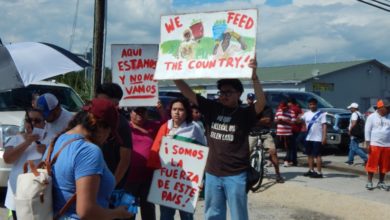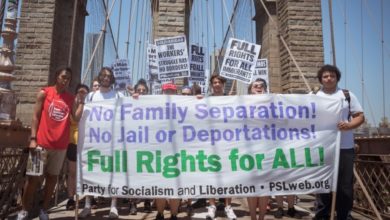A three-judge panel from the 9th Circuit Court of Appeals dealt a major blow to hundreds of thousands of refugees in a September 14 ruling on Temporary Protected Status. The judges overturned a 2018 lower court decision to freeze a move by the Trump administration revoking this status for refugees who came to the United States from El Salvador, Haiti, Nicaragua and Sudan.
Temporary Protected Status gives legal immigration status to people fleeing countries that have been hit by natural disasters and civil war. Now that the Trump administration has judicial approval to proceed with the revocation of TPS, 300,000 refugees face the threat of deportation.
Isabel Garcia, co-founder of the immigrant rights organization Coalición de Derechos Humanos, told Liberation News, “I find it the height of cruelty that this comes during a pandemic, that with all the problems gripping Latin America and with all the conditions that the United States has set upon them this president would decide that [the refugees] no longer deserve to be in the country … how can this administration be so cruel?”
All four countries singled out by the Trump administration and the federal judges have been prime targets of U.S. aggression. El Salvador and Nicaragua were devastated by bloody civil wars organized by the CIA against left wing revolutionary movements. Haiti has been the target of multiple U.S.-organized coups in recent decades and U.S.-based corporations ruthlessly exploit the nation. Sudan has been subjected to tight economic sanctions imposed by the U.S. for over 20 years, and has suffered direct military attack as well.
The role of racism in law and politics
The Court of Appeals decision was specifically based on its rejection of the lower court finding that the end of TPS was motivated by “racial animus” (racism) and therefore not enforceable. In its decision, the judges wrote that there was “no evidence linking the President’s animus to the TPS terminations—such as evidence that the President personally sought to influence the TPS terminations, or that any administration officials involved in the TPS decision-making process were themselves motivated by animus.”
In other words, the judges are not contesting that Trump is motivated by racism, but argued that it’s simply a coincidence that Trump’s administration then made the decision to expel hundreds of thousands of Black and Latino refugees from the country.
Garcia rejects this absurdity, stating that “the entire framework of Trump’s presidency” is racism and perpetuates “not just anti-immigrant rhetoric but policies.” She also argued that such moves are motivated by Trump’s re-election strategy, “[Trump] thinks that he has the winning ticket … excavating every single racist tendency in this country.”
With the ruling against TPS, the courts have played the role they have throughout the history of the United States — upholding injustice, endorsing racism and trampling on the rights of the oppressed. Despite the severity of this setback in the courtroom, the movement for full equality for all immigrants continues the struggle in the streets.






